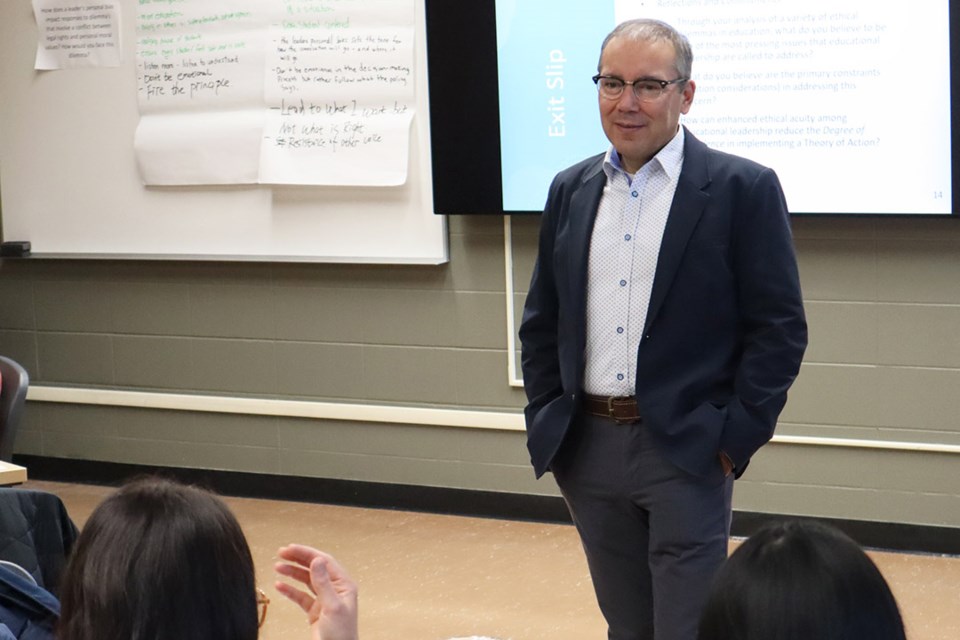SASKATOON — Dr. Gordon Martell (PhD) was destined to be an educator.
A proud member of Waterhen Lake First Nation, Sask., Martell grew up in a school, literally. His mother was a teacher in the day school in Waterhen Lake. One room of the school was the classroom for her students while Martell’s family resided in the school.
“I was born into education,” said Martell. “I couldn’t help but go into education with a start like that. My early experience at Waterhen Lake First Nation provided a solid family and community foundation.”
Martell was appointed to the College of Education’s Department of Educational Administration as an assistant professor in October this year, where he had been serving as a lecturer for the previous year. This followed a full career in K-12 education. However, his journey pointed him on a different path first.
After his family moved to Saskatoon in the 1970s, Martell would begin his schooling. Although he came from a family where academics were at the forefront, he admits he wasn’t engaged in school and struggled with confidence as a learner.
“I wasn't really engaged in school for a lot of reasons. Mainly because of identity and school not feeling like a place where I fit in, which lots of Indigenous people were experiencing at the time,” said Martell.
Even though Martell struggled in school, he gained the courage to apply to the Saskatchewan Institute of Applied Science and Technology (SIAST) Kelsey Campus—now Saskatchewan Polytechnic—in a pre-employment welding course with the goal of becoming a welder.
"I had a high school teacher in a basic math class, who I still remember, telling me that I could earn around $50,000 a year as a tradesperson,” recalled Martell. “That seemed like a million dollars a year for me at that time! So I thought, ‘I’m going to do that. I’m going to be a welder.’”
But a conversation with his relatives from Waterhen during a frigid winter would steer Martell back towards his true calling.
“I was welding outside in miserable minus-30-degree weather,” said Martell. “I was sitting with my cousins one evening complaining about how hard life and work was. They mentioned that I should apply to the Indian Teacher Education Program (ITEP) at the University of Saskatchewan.”
Since he had already proved to himself that he could be a productive learner, Martell enrolled in ITEP. His first class, Native Studies 110 with Dr. Michael Cottrell (PhD), piqued his interest in the Indigenous experience in Canada and around the world. Learning more about topics such as colonization, oppression and liberation allowed Martell to make sense of the experiences he and others like him had faced growing up.
Martell completed his Bachelor of Education degree in 1991 with the hopes of teaching in the band-controlled system. He found his first job in Beauval, Sask. as a high school teacher.
“My dad had attended Beauval Indian Residential School along with his siblings,” said Martell. “By the time I started teaching there, the school was operated by the Meadow Lake Tribal Council. I started teaching high school Native Studies, Art, English and other duties as assigned. I loved it.”
Martell would return to USask to begin his pursuit of a master’s degree so that he could lead at higher levels within schools.
“I think obtaining the master’s degree was about getting the credential so I could be a school leader,” said Martell. “Once I started, it was the learning that inspired me. I was in awe of the knowledge and experience of people like Dr. Keith Walker (PhD) and Dr. Marie Battiste (EdD). Those folks were so instrumental in my shaping who I was as a professional and a budding scholar.”
During his master’s degree, which he completed in 1998, Martell would find employment with the Greater Saskatoon Catholic Schools (GSCS) division. He would stay with the division for almost three decades. He worked as a vice principal, the first co-ordinator of First Nations and Métis education in the division, and lastly, a superintendent. Martell would return to USask to complete the PhD program in the Department of Educational Administration.
“The PhD was about my own learning journey. My dissertation was a heuristic study of Indigenous educational leadership. And it was a very personal journey for me. I was motivated by the duty to consult, and how that caused me to reflect, project and predict pathways forward in Indigenous education. I wondered where Indigenous voices were in education? How do we gather the voice for change? If consultation is part of the equation, how do we answer to that consultation as indigenous peoples?”
As a self-proclaimed cautious person, leaving GSCS to work at USask was a leap of faith. But the timing was right for an opportunity to influence participation at the post-secondary level.
“I have been lecturing in the Department of Educational Administration since 2016,” said Martell. “It felt like the right time to make the full-time switch from GSCS to USask. It was nice to leave a career [with GSCS] that was rewarding and where I hope I made a difference. GSCS provided me with plenty of opportunities and broadened my skill set. To come back to USask as an assistant professor is a great way to round out my career.”
— Submitted by USask Media Relations




